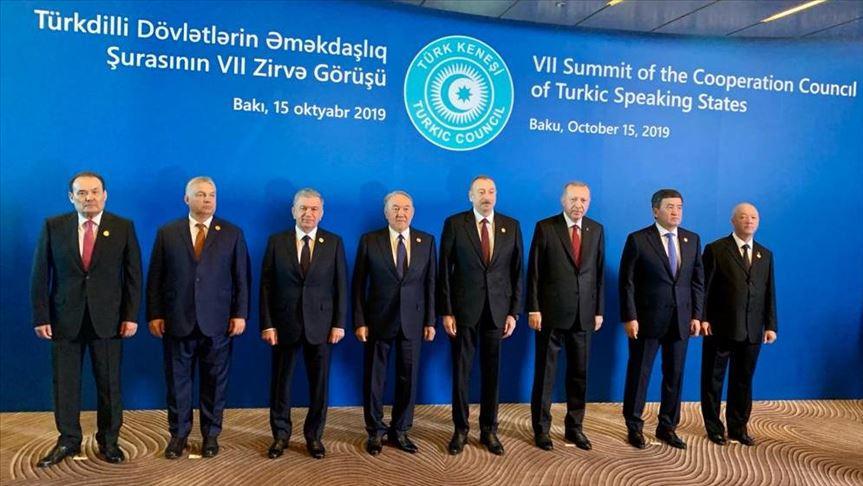Turkic Council states support Karabakh solution within Azerbaijan’s territorial integrity

Against the background of new realities emerging in the South Caucasus region following Azerbaijan's counteroffensive operations in its Armenian-occupied territories, members of the Turkic Council and also Collective Security Treaty Organization (CSTO), Kazakhstan and Kyrgyzstan, seem to stand by Azerbaijan rather than Armenia.
An analysis by the TRT World Research Centre conducted in this September has drawn this conclusion. It listed the Nagorno-Karabakh solution among the challenges standing before the Turkic Council member states in 2020.
Nagorno-Karabakh
According to the analysis, “the unity in the decision-making process in the Turkic Council was held in high regard by President Ilham Aliyev as a great asset in one of his recent speeches. President Aliyev stated that despite the premier of Armenia, Nikol Pashinyan, seeking help from the Collective Security Treaty Organization (CSTO) after the Tovuz clashes, Kazakhstan and Kyrgyzstan, members of both CSTO and Turkic Council, stood beside Azerbaijan. It showed that the potential of the Turkic Council and organic bonds based on shared values and culture between its members can be superior to the bonds between the members of the CSTO,” it added.
At an extraordinary online summit chaired by Azerbaijan on 10 April, 2020, the Turkic Council reaffirmed once again its commitments to the norms and principles of international law and reiterated the importance of the early settlement of the Nagorno-Karabakh conflict, based on sovereignty, territorial integrity and the inviolability of the internationally recognized borders of Azerbaijan.
Common declarations made by the Council hold strategic importance to understand the position of the member states in various strategic issues, such as security and political affairs. The increasing need for a united voice and regional solidarity to stand against the common threats strengthen the role of the Council as a major contributor to global peace and stability. The Turkic Council derives its main power from the organic bonds between its participating countries, which allow the organization to build values based on the shared history and mutual trust, rather than the purely political interests.
In this context, the Secretary-General of the Turkic Council, Baghdad Amreyev, strongly condemned and criticized Armenia's attack on the Azerbaijani border territory of Tovuz on July 12-14, 2020, a densely populated area that is home to civilians. He urged an immediate end to the fighting and called on the parties to de-escalate the situation and continue to seek ways to resolve the conflict peacefully on the basis of generally accepted principles and norms of international law and the related resolutions of the UN Security Council adopted in 1993. As part of their joint fight against crises, the Council released a common condemnation of the so-called "presidential and parliamentary elections" in the Armenian-occupied Nagorno-Karabakh region of Azerbaijan on March 31, 2020.
In early October 2020, Baku received another support from the Turkic Council member states. In a phone call that took place a few days after the 27 September counteroffensive operations by Azerbaijan, Turkic Council Secretary-General Amreyev again expressed support for the conflict settlement based on Azerbaijan’s sovereignty, territorial integrity, and inviolability of its borders.
In turn, Bayramov expressed gratitude to the Turkic Council for its objective position and support for Azerbaijan.
COVID-19
“Azerbaijan's term as chair of the organization was notable for its swift action, most notably for the call of the Extraordinary Online Summit on the COVID-19 pandemic on April 10, 2020, with the initiative of President Ilham Aliyev, to discuss the possibilities of cooperation between the member and Observer states which resulted in the adoption of the Baku Declaration, reflecting the will for solidarity and further action. The Turkic Council became the first international body responding to worldwide calls to fight against the pandemic that has held our planet captive,” the abovementioned analysis noted.
As a result of the extraordinary Summit, cooperation efforts among the Turkic Council countries gained new momentum also in the areas of transportation, economy, trade, customs and migration. Transport ministers agreed on coordinating the uninterrupted flow of food, medical products and humanitarian aid to maintain supply chains, including the launch of a "green corridor" - an international fast-track transport line for essential goods.
The greater purpose of the crisis meetings on the level of ministers and high-level officials was to coordinate the continuation of supply chains and trade between member states despite the COVID-19 pandemic, the research added.
Feedback on the Turkic Council
The cooperation between the Turkic-speaking countries evolved on a slow but stable course crowned with the Nakhchivan Agreement on Oct 3, 2009, which laid the fundamentals of the Turkic Council.
Ten years after its foundation, which was celebrated at its seventh summit in Baku last year, the Council started to project its power in various areas. Originally founded by Azerbaijan, Kazakhstan, Kyrgyzstan and Turkey, the Council extended its full membership to Uzbekistan and even welcomed Hungary, an EU member, to its ranks as an observer country. Thus, the geographic boundary of the Council is expanding together with the potential for greater cooperation among its member and observer states.
Based in Istanbul, the organization is taking a firm stance towards international developments concerning its members. Its developing structure emboldened with historical fraternal ties has let it boost its worldwide image by projecting the common voice of its members.
Follow us on Twitter @AzerNewsAz
Here we are to serve you with news right now. It does not cost much, but worth your attention.
Choose to support open, independent, quality journalism and subscribe on a monthly basis.
By subscribing to our online newspaper, you can have full digital access to all news, analysis, and much more.
You can also follow AzerNEWS on Twitter @AzerNewsAz or Facebook @AzerNewsNewspaper
Thank you!
